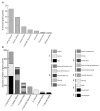Boosting RSV Immunization Uptake in The Netherlands: (Expectant) Mothers and Healthcare Professionals' Insights on Different Strategies
- PMID: 41150439
- PMCID: PMC12567916
- DOI: 10.3390/vaccines13101051
Boosting RSV Immunization Uptake in The Netherlands: (Expectant) Mothers and Healthcare Professionals' Insights on Different Strategies
Abstract
Background: Respiratory syncytial virus (RSV) is a major cause of infant respiratory illness, leading to significant hospitalizations. Two preventive strategies exist: maternal vaccination and a long-acting monoclonal antibody for neonates. In The Netherlands, neonatal immunization is planned to start from autumn 2025 onward, contingent on acceptance by parents and healthcare professionals. Maternal vaccination is already available at own costs. Understanding acceptance, perceptions, and barriers is critical for effective implementation. This study explores these factors to inform strategies for optimal uptake. Methods: This mixed-method study involved semi-structured online interviews with 21 (expectant) mothers (EMs) and 32 healthcare professionals (HCPs) involved in maternal and neonatal care (e.g., pediatricians, youth doctors/nurses, obstetricians, midwives, and general practitioners) and a quantitative descriptive analysis of factors influencing EM choices. Interviews were transcribed and thematically analyzed. Results: Both EMs and HCPs showed strong support for RSV immunization, with a preference for maternal vaccination or a combined approach. Concerns about neonatal injections during the sensitive postpartum period and unfamiliarity with newborn injections (e.g., vitamin K) influenced preferences. EMs noted hesitation about additional pregnancy/postpartum vaccinations, emphasizing the importance of well-timed interventions. HCPs highlighted logistical challenges, such as defining responsibilities, navigating National Immunization Program (NIP) changes, and ensuring readiness. All interviewed individuals value the option to choose between strategies, necessitating informed decision-making and respect for preferences. EMs make their final decision together with their partner, supported by expert information and their personal environment. Conclusions: Support for RSV immunization is high, with maternal vaccination preferred, though neonatal immunization is accepted if appropriately timed. Providing clear personalized and consistent information, heightened public awareness of RSV's impact, respecting individual choices, and offering options are key to maximizing uptake.
Keywords: RSV; neonatal immunization; prevention; vaccination.
Conflict of interest statement
The authors declare no conflicts of interest.
Figures

References
-
- Simões E.A.F., Pahud B.A., Madhi S.A., Kampmann B., Shittu E., Radley D., Llapur C., Baker J., Marc G.P., Barnabas S.L., et al. Efficacy, Safety, and Immunogenicity of the MATISSE (Maternal Immunization Study for Safety and Efficacy) Maternal Respiratory Syncytial Virus Prefusion F Protein Vaccine Trial. Obstet. Gynecol. 2025;145:157–167. doi: 10.1097/AOG.0000000000005816. - DOI - PMC - PubMed
-
- Ares-Gómez S., Mallah N., Santiago-Pérez M.I., Pardo-Seco J., Pérez-Martínez O., Otero-Barrós M.T., Suárez-Gaiche N., Kramer R., Jin J., Platero-Alonso L., et al. Effectiveness and impact of universal prophylaxis with nirsevimab in infants against hospitalisation for respiratory syncytial virus in Galicia, Spain: Initial results of a population-based longitudinal study. Lancet Infect. Dis. 2024;24:817–828. doi: 10.1016/S1473-3099(24)00215-9. - DOI - PubMed
-
- Paulson S., Munro A.P.S., Cathie K., Bedford H., Jones C.E. Protecting Against Respiratory Syncytial Virus An Online Questionnaire Study Exploring UK Parents’ Acceptability of Vaccination in Pregnancy or Monoclonal Antibody Administration for Infants. Pediatr. Infect. Dis. J. 2025;44:S158–S161. doi: 10.1097/INF.0000000000004632. - DOI - PubMed
LinkOut - more resources
Full Text Sources

